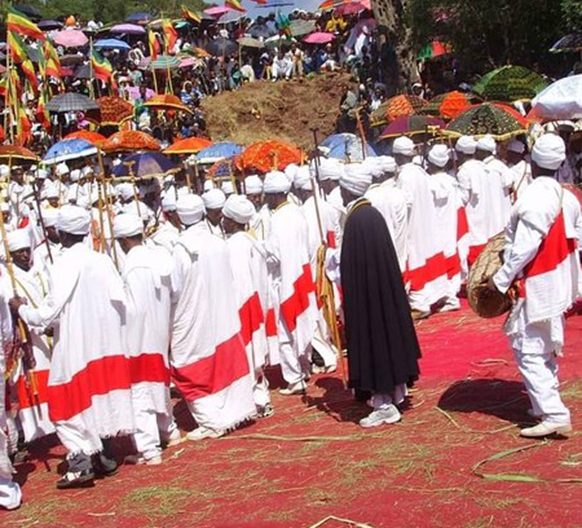
Timket, the festival that commemorates the Baptism of Jesus Christ by John the Baptist at the River Jordan, is one of the outdoor religious festivals celebrated among adherents of the Ethiopian Orthodox Church and the Ethiopian Catholic Church uniquely and colorfully.
The festival, in addition to its religious values, has considerable importance in terms of promoting cultural and religious diversity, strengthening unity and togetherness, preaching peace, love and solidarity, which are crucial for peaceful coexistence among peoples who have different histories, cultures, religions, traditions, norm, while keeping their distinct identities.
As Ethiopia is a diverse country, Timket Festival is an important showground that portrays Ethiopia’s diversity and a platform that one can learn about the culture of others, help to know about other cultures, simply respect and appreciate the values and beliefs that are crucial for peaceful coexistence among different nations, nationalities, and people.

It is not uncommon to observe people of different ethnicities, religions, cultures and traditions mingling and taking part in the Timket celebration, adding some color to the festival. The festival also shows how a diverse country Ethiopia is.
“Timket festival, beyond its religious values, helps to strengthen social interaction” said Kesis Tagay Tadele, General Secretary of the Inter-Religious Council of Ethiopia.
Speaking to EPA in relation to Ketera and Timket festivals, Kesis Tagay said that Timket besides its religious values will help to strengthen social interaction, promote and develop the culture and values of the community.
According to him, the Timket festival provides an opportunity to introduce the essence of Ethiopia to the rest of the world and helps to strengthen national unity.
Mentioning that Timket is one of the intangible cultural heritages inscribed by the United Nations Educational, Scientific and Cultural Organization (UNESCO), Intangible Cultural Heritage of Humanity Kesis Tagay said that every year, hundreds of thousands of people come out to the square to celebrate the day.
According to him, Ethiopians, regardless of religious differences—followers of Christianity and non-Christians—use the festival to showcase their values, cultures, and heritages. At the celebration, traditional costumes, cultural songs and dances that portray the identities of different nations and nationalities in Ethiopia will be displayed. A number of foreigners from different parts of the world will also flock to Ethiopia to attend the religious and cultural ceremonies conducted by the church people and the congregations at places where the ceremony is carried out.
“The festival is a celebration of humbleness and togetherness. And those people who are not followers of the Christian faith express fraternity and togetherness to their Christian brothers and sisters by offering water, sweeping the place and cleaning the streets where the tabots pass through to strengthen social ties,” he remarked.
While he explains the origin of the festival, Kesis Tagay said, Timket, according to the teachings of the Ethiopian Orthodox Tewahido Church, is the day that Jesus Christ was baptized in the Jordan River by John the Baptist, who was also called “The Street Sweeper” when he turned 30. And in a manner that symbolizes the travel of Jesus Christ from Galilee to Jordan to get baptized, the tabots are taken out of their thrones on the eve of Timket and taken to a place where there are seas or ponds that are filled with water to spend the night there.
The day, as it reveals the divine authority of Christ, is a public festival in which the tabots blessed the congregation, the liturgy is performed and the baptism is performed. Finally, the tabots are returned to their glory accompanied by a large congregation. When the celebration is conducted in such a way, with a gathering of hundreds of thousands of people with different values, cultures, and traditions provides opportunities to strengthen social ties, he reiterated.
Underscoring the importance of marking the day in a manner valuing peace, togetherness, and the spirit of fraternity, Kasis Tagay said that when the Christian people celebrate the festival, it should be done in a way that preserves the teachings of the religion and the values of spirituality.
Speaker of the House of Federation Agegnehu Teshager, on his part underlined the role the Timket festival can play in strengthening social ties, aside from its religious values, FBC reported.
In his congratulatory message extended to followers of the faith, the Speaker said that Timket Festivity is an event where religious and cultural values intermingle and one becomes energy, beauty and life for the other.
The support and cooperation of other faiths, especially the followers of Islam, from the beginning to the end of the festival to make it peaceful, is one manifestation that testifies that Timket is a festival that strengthens social bonds among the community, aside from its religious values, he added.
It is known that Timket is one of the open-air festivals that Ethiopia celebrates colorfully. It is also a context where multiple identities gather together, their identities are adorned by the common values they have inherited, and manifest unity in diversity.
As to him, the secret that astonishes our guests who come to our country crossing rivers and thousands of kilometers is because they witnessed our unity and the beauty of our unity created through our diversity.
Strengthening and sustaining such tolerance, support, and cooperation contributes hugely to maintaining our national unity and identity. Thus, we should work further in this regard, the Speaker added.
BY STAFF REPORTER
THE ETHIOPIAN HERALD SUNDAY EDITION 21 JANUARY 2024





